I rely on a range of top USB tools for penetration testing, including Kali Linux bootable drives packed with security and analysis tools, network sniffers like SharkTapUSB, and forensic devices such as Tableau TK8u. These tools offer fast transfer speeds, broad compatibility, and robust security features. They help me identify vulnerabilities efficiently and securely. If you want to discover the best options professionals trust, keep exploring—there’s a lot more to uncover.
Key Takeaways
- Top tools include Kali Linux bootable drives, network sniffers, USB data forensics, and power testing devices.
- Compatibility with Windows, Linux, Mac, and various USB interfaces ensures versatility for security testing.
- High-speed data transfer and passive network monitoring optimize real-time analysis and penetration assessments.
- Security features like write protection, encryption, and hardware protections safeguard testing integrity.
- Experts prefer reliable, easy-to-use tools with comprehensive functionalities for penetration testing and digital forensics.
Kali Linux OS for Hackers Bootable USB Drive

If you’re serious about penetration testing or cybersecurity, Kali Linux OS for Hackers Bootable USB Drive is an unbeatable tool. It’s compatible with most devices thanks to its USB/USB-C dual connector, making it easy to run on old or new PCs. You can boot directly from the USB or install it on your hard drive, either alongside your existing OS or as a clean setup. Kali 2024.2 offers free updates and runs without requiring an online account. It delivers a performance comparable to mainstream OS but with superior privacy, stability, and security. Plus, it’s packed with over 600 advanced tools for testing, hacking, and analysis.
Best For: cybersecurity professionals, ethical hackers, and IT security enthusiasts seeking a portable, high-performance penetration testing platform.
Pros:
- Supports a wide range of devices with USB/USB-C dual connectors for easy compatibility.
- Contains over 600 advanced tools for comprehensive security testing and analysis.
- Runs directly from USB without affecting existing systems, ensuring privacy and convenience.
Cons:
- Requires familiarity with penetration testing tools and cybersecurity concepts.
- May be less suitable for users seeking a general-purpose operating system.
- Advanced features and tools might require additional configuration or learning curve.
Kali Linux Bootable USB with Security Tools

The Kali Linux Bootable USB with Security Tools stands out as the ideal choice for cybersecurity professionals and organizations that require a all-encompassing, offline-capable penetration testing environment. It offers over 600 security tools, including Metasploit, Nmap, Wireshark, and specialized utilities for cryptography, social engineering, and wireless testing. Designed for secure, air-gapped operations, it’s perfect for environments with limited or no internet access. Its extensive toolkit makes it suitable for security assessments, training, and educational purposes. With minimal hardware requirements and no need for additional downloads, it ensures readiness in any secure or isolated setting.
Best For: cybersecurity professionals, organizations with strict compliance needs, and educational institutions seeking a complete offline cybersecurity toolkit.
Pros:
- Offers over 600 security tools including Metasploit, Nmap, and Wireshark for comprehensive security assessments
- Fully operational offline, ideal for air-gapped networks and secure environments
- Ready-to-use, no additional downloads required, facilitating quick deployment and testing
Cons:
- Requires a 64-bit CPU and specific hardware configurations, potentially limiting older systems
- May need to disable secure boot and enable UEFI mode for installation
- The extensive toolkit may be overwhelming for beginners unfamiliar with advanced cybersecurity tools
BitTradeOne USB Cable Tester (Assembled) for USB MiniB, MicroB, Type-C Cables

The BitTradeOne USB Cable Tester (Assembled) for MiniB, MicroB, and Type-C cables is an ideal choice for professionals and enthusiasts who need quick, accurate diagnostics of their USB cables. It easily checks resistance values and displays status on a clear screen, ensuring reliable performance. Powered by a small CR2032 battery, its compact design fits comfortably in your hand, making it perfect for on-the-go testing. The device supports various USB cable types, including MiniB, MicroB, and Type-C, and features USB digital testing capabilities. Its user-friendly interface and detailed manual make it accessible for both experts and beginners.
Best For: professionals, technicians, and electronics enthusiasts who need quick, reliable testing of various USB cables on the go.
Pros:
- Supports multiple USB cable types including MiniB, MicroB, and Type-C for versatile testing.
- Compact and lightweight design, powered by a small CR2032 battery for portability.
- Easy-to-read display and user-friendly interface, suitable for both beginners and experts.
Cons:
- Limited to testing resistance and basic digital functions, without advanced diagnostics.
- Battery replacement may be needed over time due to use of a coin cell battery.
- The manual is in English only, which might be a barrier for non-English speakers.
Kali Linux 2024.4 Bootable USB for Penetration Testing and Ethical Hacking
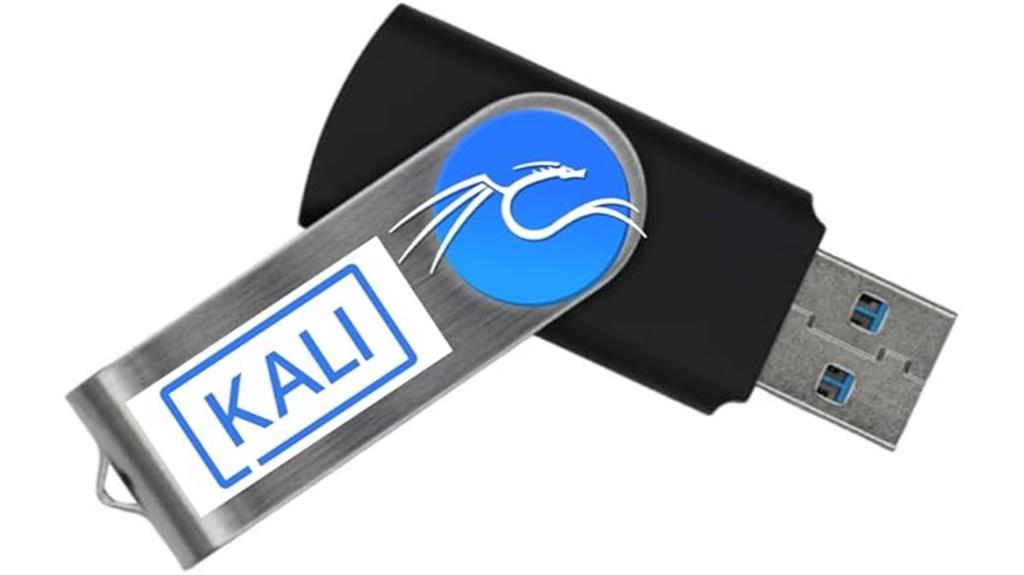
For cybersecurity professionals and ethical hackers seeking a portable, reliable tool, Kali Linux 2024.4 Bootable USB stands out as an ideal solution. This 8GB drive boots directly into Kali Linux, providing immediate access to a full suite of security testing tools without installation. Compatible with most modern hardware, it’s perfect for network analysis, vulnerability assessments, and security audits on the go. Its compact, encrypted design guarantees secure operations and easy portability. With positive reviews and a 30-day support policy, this USB offers a dependable, versatile platform for penetration testing anytime, anywhere—making it a must-have for serious cybersecurity work.
Best For: cybersecurity professionals, ethical hackers, and IT enthusiasts seeking a portable, secure, and reliable tool for penetration testing and security assessments.
Pros:
- Portable and bootable directly from an 8GB USB, enabling on-the-go cybersecurity testing
- Supports a comprehensive suite of cybersecurity tools for network analysis, vulnerability assessment, and more
- Secure, encrypted design ensures safe operations and data protection
Cons:
- Limited storage capacity (8GB), may require additional space for large data or logs
- USB read speed of 12 MB/sec could affect the efficiency of data transfer during intensive tasks
- Compatibility may vary with very old hardware or specific BIOS configurations
Kali Linux OS Bootable USB Drive for Penetration Testing
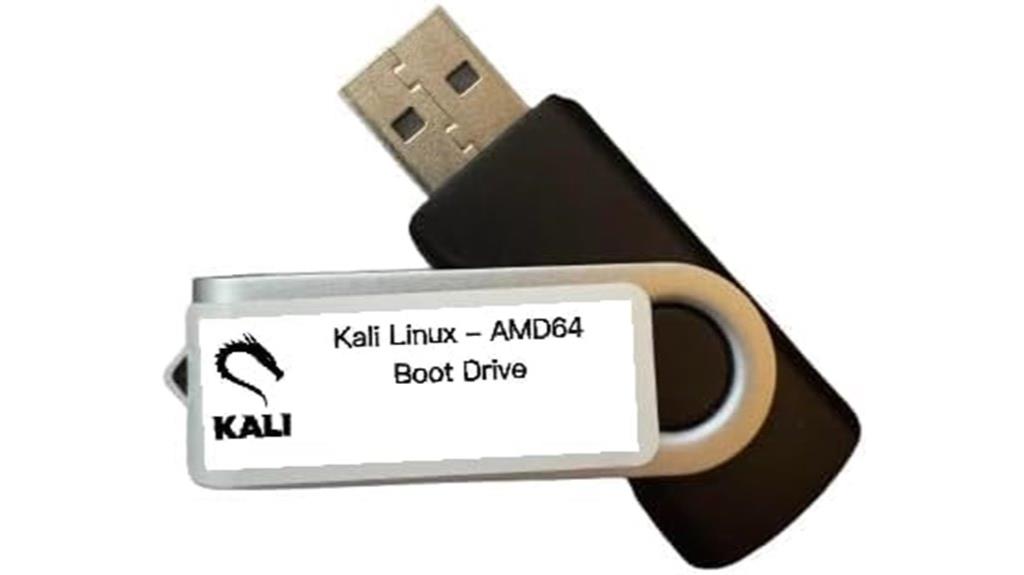
Are you a cybersecurity professional or enthusiast seeking a portable, all-in-one hacking environment? The Kali Linux OS Bootable USB Drive is perfect for you. It’s a specialized operating system packed with over 600 tools for penetration testing, network reconnaissance, forensics, and exploit development. You can run it directly on any compatible system without installation, making it ideal for on-the-go assessments or training. Lightweight at just 0.212 ounces, it offers flexibility and convenience. Whether you’re a beginner or a pro, this USB drive provides a thorough, portable platform to sharpen your hacking skills and perform advanced security tests anywhere.
Best For: cybersecurity professionals, ethical hackers, and enthusiasts seeking a portable, comprehensive hacking environment for on-the-go security testing and training.
Pros:
- Contains over 600 pre-installed security tools for diverse cybersecurity tasks
- Portable and bootable directly from USB without the need for installation
- Suitable for both beginners and experienced professionals to learn and conduct advanced security assessments
Cons:
- Mixed customer reviews with some reports of non-functionality or scams
- Relatively high price variability and limited warranty details
- May require technical knowledge to effectively use and troubleshoot potential issues
The Ultimate USB All-in-One Bootable Supertool

If you’re into penetration testing or cybersecurity, the Ultimate USB All-in-One Bootable Supertool is an indispensable asset. This high-performance device combines speed, versatility, and style in a compact package, supporting dual USB A and C ports with over 1000 Mbps transfer rates. It’s loaded with more than 50 operating systems and tools, from forensic suites to hacking distributions like Kali Linux, and even gaming and server environments. Its robust design includes offline AI models for advanced analysis, making it ideal for recovery, troubleshooting, and on-the-go tasks. Weighing just 8 ounces, it’s perfect for professionals who need a reliable, all-in-one portable toolkit.
Best For: cybersecurity professionals, IT technicians, and system administrators needing a versatile, high-speed, all-in-one portable toolkit for recovery, testing, and system management.
Pros:
- Supports over 50 preloaded operating systems and tools, offering extensive versatility for various tasks.
- High-speed data transfer with USB 3.2 Gen2, exceeding 1000 Mbps for rapid operations.
- Durable, stylish design with dual USB A and C ports, plus offline AI models for advanced analysis.
Cons:
- The size (9 x 5 x 2 inches) may be bulky for pocket portability.
- Weighs 8 ounces, which might be slightly heavy for extended handheld use.
- Limited information on software update or expansion options beyond preloaded tools.
USB Bootable 3-in-1 USB Flash Drive for Kali, Tails, Caine (32GB)

The USB Bootable 3-in-1 USB Flash Drive is an excellent choice for cybersecurity professionals and IT students who need a versatile toolkit for penetration testing, digital forensics, and privacy assessments. It features 32GB of storage and includes Kali Linux 2024 (plus a bonus version from 2023), Tails OS 6.4, and CAINE 13— all official, 64-bit releases. Compatible with most PC brands using BIOS or UEFI, it supports live sessions and installation options, making it ideal for security testing or ongoing work. The drive comes with a quick-start guide and customer support, providing a reliable, all-in-one solution for hands-on cybersecurity training and investigations.
Best For: cybersecurity professionals, IT students, and system administrators seeking a versatile, portable toolkit for penetration testing, digital forensics, and privacy assessments.
Pros:
- Supports multiple Linux distributions (Kali Linux, Tails, CAINE) in one device, ideal for diverse security tasks.
- Compatible with most PC brands and supports both live sessions and installation modes for flexibility.
- Comes with a quick-start guide and customer support, making it user-friendly for beginners and experts alike.
Cons:
- Not compatible with Macs, Chromebooks, or ARM-based devices, limiting its versatility across all hardware.
- Some users report issues with persistence mode functionality, affecting data retention during live sessions.
- Price and build quality concerns noted in reviews; may be less reliable than custom-built solutions or trusted brands.
CyberEZQ USB Flash Drive for Kali Linux 2022.4 with Persistence

Designed for security professionals and ethical hackers, the CyberEZQ USB Flash Drive for Kali Linux 2022.4 with Persistence offers a portable, bootable environment that runs directly from the device. With 32GB of capacity, it includes Kali Linux 2022.4 64-bit, enabling quick deployment for penetration testing, recovery, or as an extra PC. Its lightweight design, weighing just 0.35 ounces, and keychain attachment make it highly portable. Compatible with PC hardware via USB Type A, it’s easy to use and doesn’t require installation. This drive is ideal for on-the-go testing, especially on older or limited hardware setups, providing flexibility and convenience for security tasks.
Best For: security professionals and ethical hackers seeking a portable, bootable Kali Linux environment for penetration testing and recovery tasks on various hardware setups.
Pros:
- Compact, lightweight design with keychain attachment for easy portability
- Runs Kali Linux 2022.4 64-bit directly from USB without installation
- Suitable for use on older or limited hardware, providing flexible security testing options
Cons:
- Modest customer ratings, averaging 2.2 out of 5 stars, indicating mixed reviews
- Limited storage capacity of 32GB may restrict the number of tools and utilities stored
- Manufactured by a generic supplier, which may impact brand trust and warranty support
Triplett USB-Bug Dual-Output Inline USB-A Tester with Data Masking Port
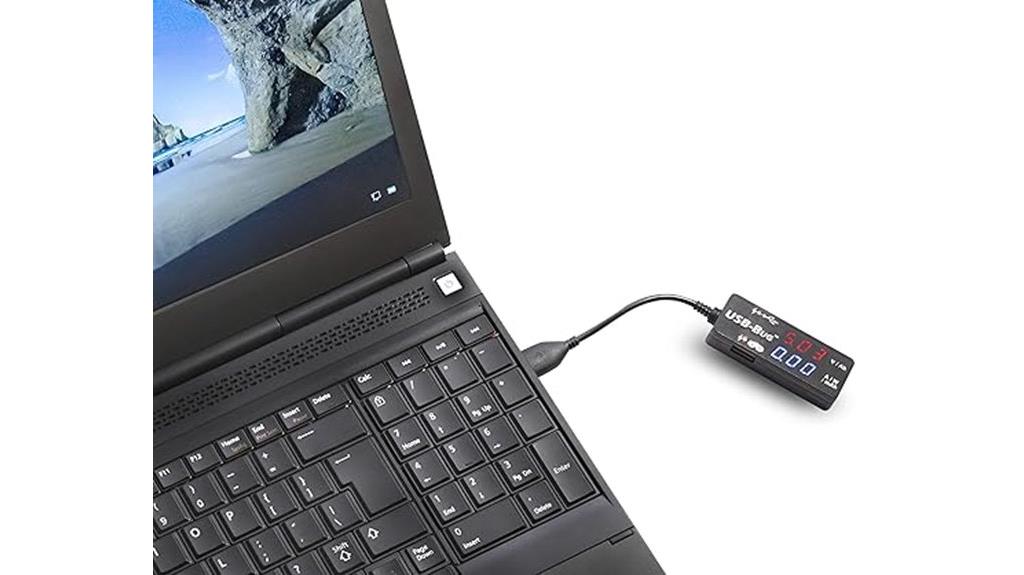
The Triplett USB-Bug Dual-Output Inline USB-A Tester stands out for anyone needing secure, real-time power and data testing during penetration assessments. It can measure power (0-99.9W), voltage (3.2-30VDC), and current (0-3A) on USB 2.0/3.0 ports, with indicators for over-voltage, under-voltage, and over-current. Its dual USB outputs include an unmasked port for data transfer and a masked port to block data, ensuring secure charging. The device is compact, easy to use, and assesses maximum safe current, making it ideal for troubleshooting, verifying power delivery, and maintaining data security during testing.
Best For: tech technicians and security professionals needing secure, real-time power and data testing during penetration testing and troubleshooting.
Pros:
- Measures power, voltage, and current with clear indicators for safety thresholds
- Dual USB outputs with data transfer and data blocking options for secure testing
- Compact and easy to connect inline, suitable for troubleshooting and verification
Cons:
- Not designed for heavy-duty or industrial use; best for light, occasional tasks
- Durability concerns; feels lightweight and may be fragile over time
- Lacks detailed instructions, which may complicate setup for some users
Penetration Testing: A Hands-On Introduction to Hacking

If you’re new to penetration testing and want practical, step-by-step guidance, “Penetration Testing USB Tools” is an excellent resource to complement the concepts covered in “Penetration Testing: A Hands-On Introduction to Hacking.” Since setting up a lab environment can be time-consuming and challenging, especially for beginners, having portable tools on a USB stick allows you to perform testing in various environments without complex installations. This approach helps you practice real-world techniques like exploit development, password attacks, and reverse engineering. The book’s detailed instructions and examples make it easier to learn essential skills, even if initial setup takes time.
Best For: beginners and professionals seeking practical, hands-on guidance in penetration testing with portable tools on USB for flexible testing environments.
Pros:
- Provides portable tools that facilitate testing in diverse environments without complex setup.
- Complements detailed, step-by-step guidance from the book, enhancing practical learning.
- Enables practice of real-world techniques like exploit development and password attacks in various scenarios.
Cons:
- Setting up and configuring the USB tools initially can be time-consuming and challenging.
- Might require troubleshooting and technical troubleshooting, especially for beginners.
- Limited by hardware compatibility and software updates, potentially necessitating additional resources for optimal use.
SharkTapUSB Ethernet Sniffer

For cybersecurity professionals seeking a portable and straightforward way to monitor network traffic, the SharkTapUSB Ethernet Sniffer stands out as an ideal tool. It connects via USB 2.0 or 3.0 and provides a CAT-5 TAP port for seamless packet capture. Compatible with Wireshark and similar programs, it requires no setup—just plug and play. Inside, a 4-port switch copies traffic bi-directionally, supporting gigabit speeds up to 1Gbps. Its passive design minimizes network impact, making it perfect for troubleshooting, analysis, and debugging LLDP issues. Many users find it reliable, easy to use, and effective for inline monitoring without slowing down the network.
Best For: cybersecurity professionals and network troubleshooters needing portable, easy-to-use traffic monitoring tools without dedicated Ethernet ports.
Pros:
- Plug-and-play setup with no configuration required, compatible with Wireshark and similar programs
- Supports gigabit speeds up to 1Gbps with minimal network impact due to passive design
- Reliable for inline monitoring over extended periods without noticeable network slowdown
Cons:
- Limited to 1Gbps speeds, not suitable for multigigabit environments (2.5, 5, 10Gbps)
- Rare instances of packet loss or interference when connected via USB 2.0 or inline placement
- Some users report occasional issues with packet blocking or device boot interference
Linux Bootable USB Forensics Toolkit for PCs
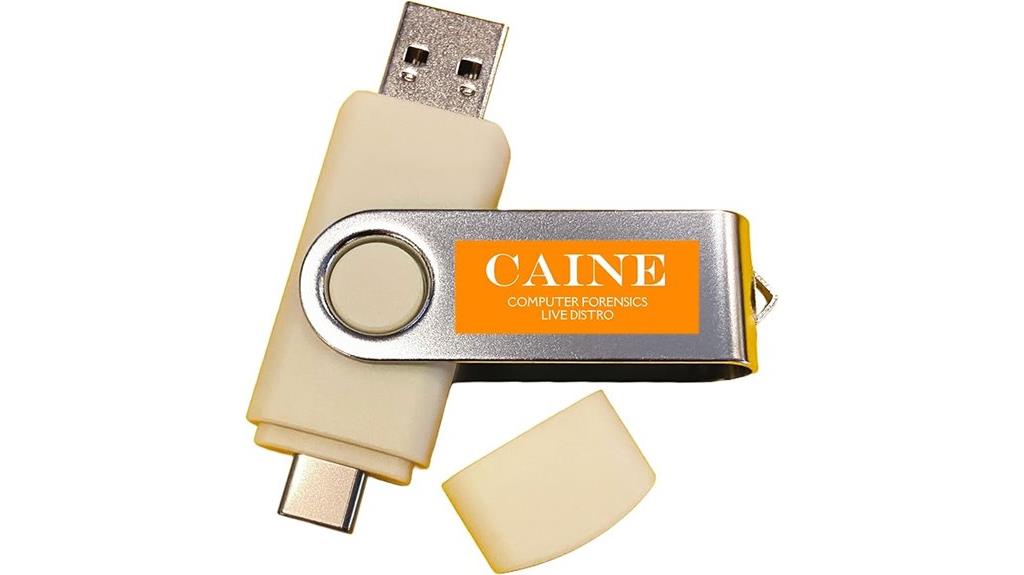
A Linux bootable USB toolkit like Caine stands out as an ideal choice for digital forensics professionals and cybersecurity experts who need a reliable, portable solution for live investigations. Caine is a Linux-based forensic utility designed for PCs, supporting systems like Windows, Mac, Linux, and Unix. It features a dual USB/USB-C connector, enabling live boot or installation on hard drives. With a user-friendly GUI and tools supporting all four investigation phases, it’s perfect for deep data analysis. Despite some booting issues, users praise its professional design and utility. It’s a versatile, portable forensic environment that’s invaluable for investigative work in the field.
Best For: digital forensics professionals and cybersecurity experts seeking a portable, Linux-based toolkit for live investigations across multiple operating systems.
Pros:
- User-friendly GUI with comprehensive tools supporting all four phases of digital investigation.
- Compatible with a wide range of PC brands and operating systems, including Windows, Mac, Linux, and Unix.
- Portable and easy to boot live or install on hard drives, facilitating field investigations.
Cons:
- Some users experience booting issues, such as black screens or BIOS compatibility problems.
- Slow boot times and performance issues reported by certain users.
- Potential interference from security software like antivirus programs, requiring pre-boot adjustments.
Tableau TK8u USB 3.0 Forensic Bridge Kit – T8u Plus Cable Kit
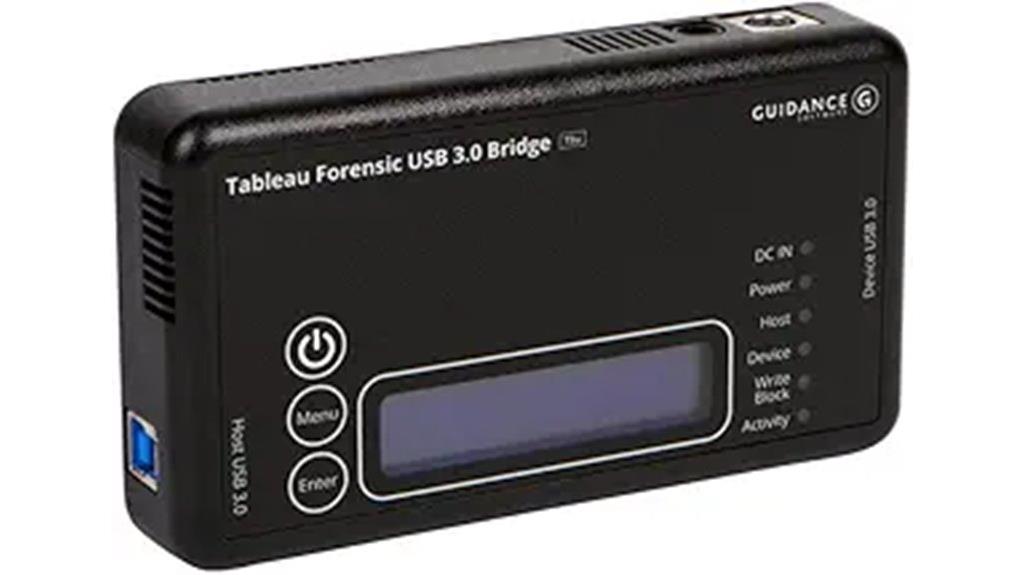
The Tableau TK8u USB 3.0 Forensic Bridge Kit, model T8u Plus, stands out as an essential tool for professionals conducting forensic data acquisition, especially when integrity and reliable write protection are critical. It features a hardware-based USB 3.0 write blocker compatible with USB 1.0, 2.0, and 3.0 devices, ensuring data remains unaltered during collection. The backlit interface simplifies status monitoring and device management. Included are a power supply, a 6-foot USB cable, a soft-sided carrying bag, and a quick start guide. Designed for durability and ease of use, this kit guarantees secure, efficient forensic acquisitions across various storage media.
Best For: forensic professionals and investigators seeking reliable, hardware-based USB write protection for secure data acquisition across multiple USB standards.
Pros:
- Hardware-based write blocker ensures data integrity during forensic collection
- Compatible with USB 1.0, 2.0, and 3.0 devices for versatile use
- Backlit interface provides clear status and device information for easy operation
Cons:
- Price may be considered high compared to basic USB adapters
- Bulkier design might be less convenient for field use
- Limited to USB devices; not suitable for other data transfer interfaces
Factors to Consider When Choosing Penetration Testing USB Tools

When selecting penetration testing USB tools, I consider several key factors to guarantee effectiveness. Compatibility with various devices, portability, toolset completeness, power capacity, and data transfer speeds all play vital roles. Evaluating these points helps me choose the right tool for reliable and efficient testing.
Compatibility With Devices
Choosing the right penetration testing USB tool depends heavily on its compatibility with your target devices. First, verify the tool supports the specific interfaces your devices use, whether USB Type-A, Type-C, or MicroUSB. Compatibility with your operating systems—Windows, Linux, or macOS—is essential for smooth operation. Check if the tool is designed for live testing or can be installed directly on the target device for persistent access. Additionally, confirm whether it works with both modern hardware and legacy systems, including BIOS-based or UEFI setups. Power requirements also matter; some devices need features like power delivery or passthrough to function correctly during testing. Ensuring these compatibilities helps prevent technical issues and guarantees that your testing process runs seamlessly.
Portability and Size
Portability and size are crucial factors to contemplate when selecting penetration testing USB tools because they directly impact how easily I can carry and deploy them in the field. Small, lightweight devices are much easier to transport, especially when I need to move quickly or work in remote locations. Compact tools can fit into pockets or attach to keychains, making them highly convenient for on-the-go testing. This minimizes bulk and allows me to carry multiple devices without adding unnecessary weight. Size also influences usability; overly large tools can be cumbersome and slow to deploy, which is a disadvantage during quick operations. A well-designed, space-efficient USB device ensures I can perform tests efficiently, even in tight or hard-to-reach environments.
Toolset Completeness
A complete penetration testing USB toolset must pack a diverse array of security utilities, including network analyzers, vulnerability scanners, password crackers, and wireless testing tools. I look for pre-installed, ready-to-use applications to guarantee I can start testing immediately without additional setup during critical moments. A versatile toolkit should also feature specialized tools for cryptography, social engineering, forensics, and exploit development, broadening its applicability across various cybersecurity tasks. Support for multiple operating systems and environments is essential, allowing me to test across different platforms and devices seamlessly. Moreover, regular updates with the latest security tools and features are crucial to stay ahead of emerging threats. A thorough, current toolset enhances efficiency and effectiveness in the field.
Power and Battery Life
When selecting a penetration testing USB tool, guaranteeing reliable power and long battery life is essential for maintaining focus during critical operations. I look for devices with a dependable power source, like built-in rechargeable batteries or consistent external power options, to support extended testing sessions. Battery life specifications matter; I prefer tools that can run for several hours continuously to avoid interruptions. Power management features are a plus, as they optimize battery use and prevent unexpected shutdowns. For off-grid testing, long-lasting batteries or the ability to connect to external sources such as USB power banks are vital. It’s also important to contemplate the device’s power consumption rate, especially for high-performance tools, to ensure my existing power solutions are sufficient and avoid rapid depletion.
Data Transfer Speeds
Choosing the right penetration testing USB tool involves more than just power and battery life; data transfer speed plays a key role in maintaining efficiency. Faster transfer rates, like those supported by USB 3.0 and above, enable quick movement of large tools and data, reducing wait times during testing. This is vital when handling sizable files or multiple tools simultaneously. However, actual speeds depend on the device’s hardware, connection type, and system compatibility, which can limit performance. High transfer speeds are especially important for real-time tasks such as network traffic capture or forensic analysis, where delays can hinder progress. Slow data transfer rates create bottlenecks, delaying deployment, analysis, and security assessments. Consequently, prioritizing speed ensures smoother, more efficient penetration testing workflows.
Ease of Use
Ease of use is a critical factor because a penetration testing USB tool should allow me to quickly and effortlessly perform tasks without getting bogged down by complicated setups. An intuitive interface that’s easy to navigate helps both beginners and experts operate efficiently. Clear labels, simple setup procedures, and minimal configuration requirements make the process straightforward. Compatibility with common hardware interfaces like USB Type A and Type C ensures seamless integration with various devices. Built-in automated features, such as resistance testing or data masking, reduce manual effort and simplify complex tasks. Additionally, extensive documentation, including quick-start guides and manuals, supports smooth operation and troubleshooting. Overall, a user-friendly tool saves time and minimizes frustration, enabling me to focus on testing rather than technical hurdles.
Security Features
Security features are a critical consideration because they protect both the testing process and sensitive data from threats. I look for tools with built-in protections like write protection or data masking to prevent accidental or malicious data changes. Encryption capabilities are essential to safeguard sensitive information stored or transferred during testing. Hardware-based protections, such as secure boot and firmware integrity checks, help ensure the device isn’t tampered with or accessed without authorization. Features like automatic detection of malicious activity or anomalies add an extra layer of security during operation. Compatibility with security standards, including USB data encryption and secure firmware updates, also matters. These features collectively strengthen the device’s security, making it a reliable tool for penetration testing without exposing critical data or systems to unnecessary risks.
Price and Value
When selecting a penetration testing USB tool, it’s vital to weigh the cost against the features and reliability it offers. Comparing prices helps guarantee you’re getting good value for your investment. Higher-priced tools often provide advanced features, better durability, or extra accessories that justify the expense. While budget options may handle basic testing, they can fall short in long-term reliability or extensive functionality. Evaluating overall value involves considering the tool’s capabilities, build quality, included features, and support services. Investing in a reputable, well-reviewed USB tool can reduce the risk of failure during critical assessments, saving you time and money in the long run. Ultimately, balancing cost with quality ensures you’re equipped with a dependable tool that meets your security testing needs effectively.
Frequently Asked Questions
What Legal Considerations Exist for Using Penetration Testing USB Tools?
When using penetration testing USB tools, I know I must consider legal boundaries. I always guarantee I have explicit permission from the system owner before testing. Unauthorized access can lead to serious legal consequences, including fines or jail time. I also stay informed about local laws and regulations related to cybersecurity testing to avoid any violations. Respecting privacy and legal protocols is essential to conduct ethical and lawful assessments.
How Do USB Tools Avoid Detection During Covert Operations?
Using USB tools during covert operations is like slipping through shadows undetected. I guarantee they avoid detection by employing obfuscation techniques, such as mimicking legitimate device behavior and encrypting payloads. I also disable autorun features and hide the tools in less obvious directories. Regularly updating and customizing my tools helps me stay ahead of security measures, making it harder for detection systems to identify my activities.
Are There Compatibility Issues With Different Device Firmware?
Yes, there can be compatibility issues with different device firmware. I’ve found that some USB tools may not work properly if the device firmware isn’t up-to-date or if it’s incompatible with specific hardware. To avoid this, I always verify firmware versions and update them when needed. Testing tools on various devices beforehand helps me identify potential issues early, ensuring smoother covert operations.
How Frequently Should Penetration Testing USB Tools Be Updated?
Think of your USB tools like a well-tuned engine—they need regular maintenance to run smoothly. I recommend updating your penetration testing USB tools at least once a month, or immediately if a new security vulnerability or tool update is released. Staying current guarantees compatibility, improves performance, and keeps your testing effective. Don’t wait for problems to arise; proactive updates are your best defense in cybersecurity.
Can These Tools Be Integrated Into Automated Security Workflows?
Absolutely, these tools can be integrated into automated security workflows. I often embed them into scripts and CI/CD pipelines to streamline vulnerability assessments and penetration testing. Automation saves me time and guarantees consistent testing across systems. Just make sure to configure the tools properly and follow best practices to avoid false positives or negatives. With the right setup, integrating these USB tools enhances your overall security posture efficiently.
Conclusion
Think of these USB tools as your trusty toolkit—each one a key to opening hidden doors in cybersecurity. When used wisely, they become your sharpest allies, slicing through digital defenses like a hot knife through butter. Whether you’re probing vulnerabilities or gathering evidence, these tools empower you to navigate the complex maze of security with confidence. Equip yourself wisely, and you’ll be the master of your own cyber adventure—ready to strike when opportunity knocks.









